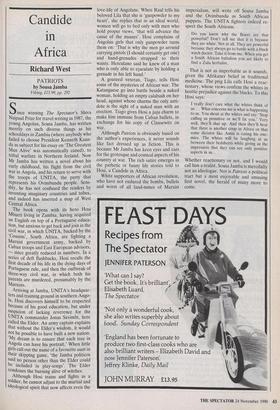Candide in Africa
Richard West
PATRIOTS by Sousa Jamba
Viking, £13.99, pp. 292
Since winning The Spectator's Shiva Naipaul Prize for travel writing in 1987, the Young Angolan, Sousa Jamba, has written merrily on such diverse things as his schooldays in Zambia (where anybody who failed to choose President Kenneth Kaun- da as subject for his essay on 'The Greatest Man Alive' was automatically caned), to tribal warfare in Northern Ireland. Now Mr Jamba has written a novel about his early childhood, his flight from the civil war in Angola, and his return to serve with the troops of UNITA, the party that represents his Ovimbundu people. Sens- ibly, he has not confused the readers by inventing imaginary countries and tribes, and indeed has inserted a map of West Central Africa.
The book opens with its hero Hosi Mbueti living in Zambia, having acquired an English on top of a Portuguese educa- tion, but anxious to get back and join in the civil war, in which UNITA, backed by the 'Cousins', South Africa, are fighting a Marxist government army, backed by Cuban troops and East European advisors, — since greatly reduced in numbers. In a series of deft flashbacks, Hosi recalls the first decade of his life in the dying days of Portuguese rule, and then the outbreak of three-way civil war, in which both his parents are murdered, presumably by the Marxists.
Arriving at Jamba, UNITA's headquar- ters and training ground in southern Ango- la, Hosi discovers himself to be respected because of his good education, but under suspicion of lacking reverence for the UNITA commander Jonas Savimbi, here called the Elder. An army captain explains that without the Elder's wisdom, it would not be possible to have built a new nation: My dream is to ensure that each tree in Angola can have his portrait.' When little girls call out the name of a favourite aunt in their skipping game, 'the Jamba politicos said no person other than the Elder could be included in play-songs'. The Elder Condones the burning alive of witches. Although Hosi trains and fights as a soldier, he cannot adjust to the martial and ideological spirit that now affects even the love-life of Angolans. When Raul tells his beloved Lila that she is 'gunpowder to my heart', she replies that in an ideal world, women will go to bed only with men who hold proper views, 'that will advance the cause of the masses'. Hosi complains of Angolan girls that only gunpowder turns them on: 'That is why the men go around carrying pistols (I should certainly get one) and hand-grenades strapped to their waists. Herculano said he knew of a man who is only able to ejaculate by holding a grenade in his left hand.'
A goateed veteran, Tiago, tells Hosi some of the mysteries of African war. The Katanguese go into battle beside a naked woman, holding an empty calabash on her head, against whose charms the only anti- dote is the sight of a naked man with an erection. Tiago gives Hosi a juju charm to make him immune from Cuban bullets, in exchange for his copy of Clausewitz on war.
Although Patriots is obviously based on the author's experiences, it never sounds like fact dressed up as fiction. This is because Mr Jamba has keen eyes and ears for the grotesque and comical aspects of his country at war. The rich satire emerges in the pathetic or funny life stories told to Hosi, a Candide in Africa.
White supporters of African revolution, who have not endured the bombs, bullets and worst of all land-mines of Marxist imperialism, will write off Sousa Jamba and the Ovimbundu as South African puppets. The UNITA fighters indeed re- spect the South Africans.
Do you know why the Boers are that powerful? Don't tell me that it is because they are white. Not at all. They are powerful because they always go to battle with a black witch doctor. Take it from me. When you get a South African battalion you are likely to find a Zulu herbalist.
That is not as improbable as it sounds, given the Afrikaner belief in traditional medicine. The prig Lila calls Hosi a reac- tionary, whose views confirm the whites in hostile prejudice against the blacks. To this Hosi says:
I really don't care what the whites think of us . . What concerns me is what is happening to us. You shout at the whites and say: 'Stop calling us primitive or we'll fix you.' Very well, they'll shut up. And then they'll hear that there is another coup in Africa or that some dictator like Amin is eating his ene- mies. The whites will be laughing at us between their bedsheets while giving us the impression that they can see only positive aspects in us. . . .
Whether reactionary or not, and I would call him a realist, Sousa Jamba is mercifully not an ideologue. Nor is Patriots a political tract but a most enjoyable and amusing first novel, the herald of many more to come.


































































 Previous page
Previous page